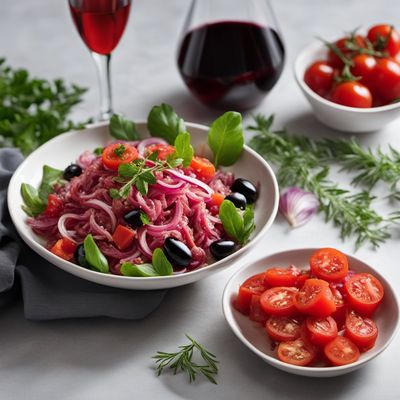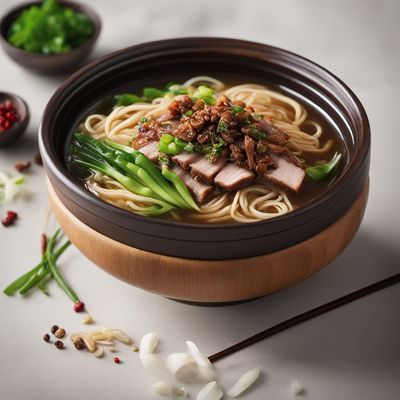
Ingredient
Boiled eggs
Egg-cellent Delights
Boiled eggs are prepared by gently cooking eggs in their shells until the whites are set and the yolks are cooked to the desired level of doneness. The resulting eggs have a firm yet tender texture, making them ideal for slicing, dicing, or mashing. Boiled eggs offer a mild and creamy flavor that pairs well with a variety of ingredients, allowing them to shine in both simple and complex recipes.
Origins and history
The practice of boiling eggs dates back centuries, with evidence of egg consumption and preparation found in ancient civilizations. Boiled eggs have been a staple in many cultures, often used as a convenient and protein-rich food source. Today, they continue to be enjoyed in various forms, from traditional breakfast dishes to modern interpretations in global cuisines.
Nutritional information
Boiled eggs are a nutrient-dense food, providing a good source of high-quality protein, essential vitamins, and minerals. They are low in calories and carbohydrates, making them a suitable option for individuals following different dietary patterns. Boiled eggs are also rich in choline, a nutrient important for brain health and development.
Allergens
Boiled eggs may not be suitable for individuals with egg allergies or intolerances. It is important to be aware of any potential cross-contamination or added ingredients that may introduce allergens, such as mayonnaise or other egg-based sauces, in dishes containing boiled eggs.
How to select
When selecting boiled eggs, choose eggs that are fresh and free from cracks or other damage. Look for eggs with clean shells and avoid those with an off-putting odor. It is also helpful to check the expiration date or the date of production, as freshness is crucial for optimal taste and safety. Consider purchasing eggs from reputable sources, such as local farmers or trusted brands, to ensure quality and freshness.
Storage recommendations
To maintain the freshness and quality of boiled eggs, store them in the refrigerator in their shells. It is best to keep them in a covered container to prevent absorption of odors from other foods. If peeled, store the boiled eggs in a bowl of cold water, changing the water daily to maintain freshness. Consume boiled eggs within 5-7 days to ensure optimal taste and safety.
How to produce
Producing boiled eggs is a simple process that can be done by anyone with access to fresh eggs and a stove. Start by placing the eggs in a saucepan and covering them with cold water. Bring the water to a gentle boil, then reduce the heat and simmer for the desired cooking time. Once cooked, transfer the eggs to an ice bath to cool and stop the cooking process. Peel the eggs carefully, and they are ready to be enjoyed or used in various recipes.
Preparation tips
Boiled eggs can be enjoyed in a variety of ways. They can be sliced and used as a topping for salads, mashed and mixed with mayonnaise to make egg salad sandwiches, or simply seasoned with salt and pepper for a quick and nutritious snack. Experiment with different cooking times to achieve the desired level of doneness, whether it's a soft-boiled egg with a runny yolk or a hard-boiled egg with a fully set yolk.
Culinary uses
Boiled eggs are a versatile ingredient that can be used in numerous culinary applications. They are commonly used in breakfast dishes such as eggs Benedict, served alongside soldiers for dipping, or incorporated into classic recipes like deviled eggs or Scotch eggs. Boiled eggs also add a protein boost to salads, sandwiches, and grain bowls, providing a satisfying and nutritious element to these dishes.
Availability
Boiled eggs are widely available in grocery stores, supermarkets, and farmers markets worldwide. They are a staple ingredient in many cuisines and can be found in various forms, including fresh eggs, pre-boiled and peeled eggs, or even pickled eggs in some regions.
More ingredients from this category
Recipes using Boiled eggs » Browse all

Tsukemen - Savory Dipping Noodles
Umami Delight: Savory Dipping Noodles with Flavorful Broth

Dutch-Inspired Ramen
Dutch Delight Ramen: A Fusion of Japanese and Dutch Flavors

Nasi Liwet with Fragrant Coconut Rice and Spiced Chicken
Indonesian Delight: Fragrant Coconut Rice with Spiced Chicken - Nasi Liwet

Indonesian-style Nasi Lemak
Savory Coconut Rice with Indonesian Flavors

Ensalada Murciana - Spanish Tomato and Tuna Salad
Mediterranean Delight: Refreshing Tomato and Tuna Salad

Salsa a la Huancaina with a Twist
Peruvian Delight: Creamy Salsa a la Huancaina

Egg and Cress Sandwich with a Central African Twist
Savory Egg and Cress Sandwich with Central African Flavors

Tofu Medley
Indonesian Tofu Delight

Sindhi-style Paté de Pâques
Savory Sindhi Easter Pie: A Fusion of French and Sindhi Flavors

Southeast Asian Spiced Black Pudding Scotch Egg
Crispy Delights: Southeast Asian Spiced Black Pudding Scotch Egg

Huaiyang-style Onomichi Ramen
Savory Huaiyang Noodle Delight

Puerto Rican Style Ramen
Caribbean Fusion Ramen: A Taste of Puerto Rico in a Bowl

